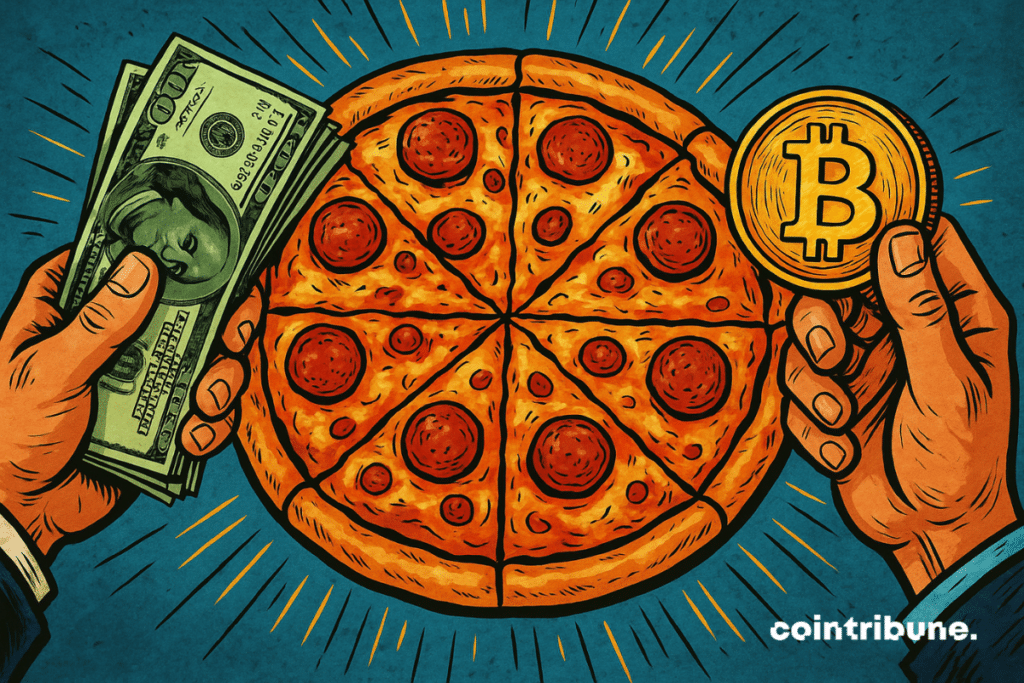Bitcoin: Michael Saylor Is Making Headlines
Is it important for bitcoin to become a popular means of payment? Michael Saylor reignited the controversy in a tweet published on “pizza day.”

In brief
- The bitcoin community is inflamed following Michael Saylor’s remarks advising not to spend bitcoins.
- Bitcoin stands out as a finite store of value, a censorship-resistant payment network, a tool of freedom against banking restrictions, and an ally for energy management due to its flexibility for electrical grids.
- Although some, like Saifedean Ammous, predict that bitcoin will replace fiat currencies, Michael Saylor rejects this idea.
Pizza Day
Bitcoiners have been on edge lately. The reason is the eternal debate about SPAM. This week, the angry mob targeted Michael Saylor. The CEO of Strategy advised buying pizza with dollars and holding onto bitcoins, provoking sarcasm and confusion.
The dispute was already intense since the American restaurant chain Steak ‘n Shake added the bitcoin payment option a few days earlier. The reason being that Steak ‘n Shake immediately converts BTC to dollars. “What’s the point of paying in bitcoins if they don’t keep them in reserve?” some say. Why shoot oneself in the foot by feeding downward pressure?
Another argument is that bitcoin transaction fees are higher than with Visa or Mastercard. Certainly, Lightning Network fees are minimal, but platforms like Coinbase take a “spread” (~2.45%) when buying bitcoins (among other fees).
And what about “on-chain” transaction fees if the whole world reloaded their Lightning wallet every month?
Conversely, it is free to get rid of euros or dollars. The 0.30% fees collected by Visa and Mastercard are paid by merchants. It is rather 3% outside the Western world, but this difference is geopolitical.
Finally, note that paying in bitcoins is still currently a taxable event. Let us hope, however, that this punitive taxation will soon be a thing of the past.
Now that we’ve said all that, it must be acknowledged that the controversy goes far beyond transaction fees. The real underlying question is whether bitcoin can completely replace the “fiat system.”
The 4 facets of bitcoin
Before trying to answer the big question, let’s recall the main use cases of bitcoin. They can be summarized into these four main themes:
- Store of value;
- Payments;
- Freedom;
- Energy.
Bitcoin is a technological breakthrough. For the first time in history, humanity has a currency existing in an absolutely finite quantity. The ultra-liquid store of value aspect is undoubtedly the primary reason for its global success.
More and more multinationals are making it their main treasury asset, and states are next on the list. Several senators such as Cynthia Lummis propose selling gold in favor of bitcoin as a reserve currency.
Moreover, Bitcoin is both a currency and a payment network, two-in-one. What’s more, it is a censorship-resistant network, unlike the SWIFT network. Russia knows this well. “Who can ban bitcoin? Nobody,” Vladimir Putin declared at the end of last year.
Taiwan has also realized this. As have Canadian truckers whose bank cards were deactivated to prevent them from protesting. Nobody is safe, not even the President of the International Court of Justice who just had his British bank accounts frozen.
It should also be noted that international payments are extremely expensive. Bitcoin clearly has an advantage here. It is a significant asset when claiming to serve as an international reserve currency.
Finally, it is established that the bitcoin industry is a tremendous ally for grid managers by offering a highly controllable load shedding option. It is also a considerable financial boon for energy producers. Not only by buying electricity throughout the day but also by reducing the needs for peak power plants.
Our article on the topic: No blackout with bitcoin miners.
But back to the heart of the disagreement. Does bitcoin need to replace the fiat system to succeed?
Bitcoin vs Fiat
Many believe that bitcoin will inevitably replace national currencies. This is what Saifedean Ammous preaches, an opinion that Michael Saylor completely rejected during an exchange with him:
You are an ideologue […]. You get bogged down in an argument against banks and credit theory which, moreover, has nothing to do with bitcoin. Essentially, you oppose anyone being able to borrow money; it’s ridiculous.
Michael Saylor
Credit is indispensable to complex civilizations. Banks must be able to create money ex nihilo and destroy it upon repayment. It is impossible to build railways, nuclear power plants, or subways without this monetary elasticity.
The next six French nuclear reactors will cost between 50 and 100 billion euros. Without the ability to create this money ex nihilo, 10 million French people would each have to lend the equivalent of 10,000 euros (and lock this money for twenty years!). This system does not scale.
The fiat system has its flaws, especially if states go into debt shamelessly, not to mention energy scarcity that slows productivity. The risk of hyperinflation is real if we poorly anticipate the inevitable decline of oil production.
In any case, saving in euros, dollars, or pesos is a serious mistake. Bitcoin is a far better store of value. Previously, only the rich could protect themselves (and benefit) from inflation. Why? Because you had to already be wealthy to buy art, luxury real estate, etc.
We now all have access to what is rarest, whether rich or poor. Such is the promise of bitcoin, and not to replace Visa or Mastercard.
If you liked this article, you will certainly appreciate this one: The key argument in favor of Bitcoin.
Maximize your Cointribune experience with our "Read to Earn" program! For every article you read, earn points and access exclusive rewards. Sign up now and start earning benefits.
Bitcoin, geopolitical, economic and energy journalist.
The views, thoughts, and opinions expressed in this article belong solely to the author, and should not be taken as investment advice. Do your own research before taking any investment decisions.